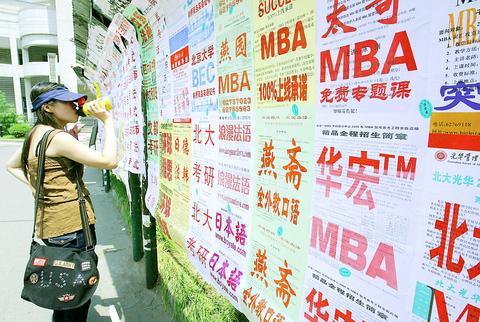Fifteen years after troops backed by tanks crushed China's democracy movement centered on Beijing's Tiananmen Square, some survivors and families of the dead are still seeking redress.
For Ding Zilin (

PHOTO: AFP
"Today, as we face those names so familiar to us, our hearts continue to tremble and bleed," she wrote on behalf of the Tiananmen Mothers advocacy group in a letter sent to reporters in Beijing. "We should remember that the system we live in is full of barbarism, inhumanity and hypocrisy.
"It remains a system in which freedom and democracy are smothered, in which any sparks of civilization must be extinguished, and in which any who challenge this system must be ruthlessly suppressed," she wrote.
The mothers demanded that China's current leadership, led by President Hu Jintao (胡錦濤) and Premier Wen Jiabao (溫家寶), who are keen to burnish their "men of the people" image, recognize the military suppression as a crime against humanity.
"[They need] the kind of courage that can face the crimes of history with true repentance," wrote Ding, who rights groups say is under house arrest to prevent her from meeting journalists or publicly commemorating the June 4 anniversary.
Hu replaced Jiang Zemin (
The Tiananmen Mothers recorded the names of 182 people killed during the massacre, including Cheng Renxing (程仁興), who fell at the base of a flagpole flying the Chinese flag at the center of the square, and Wu Guofeng (吳國鋒), who appeared to die from bayonet wounds.
In March, Wen ruled out an appraisal of the 1989 protests, citing the need for unity and stability.
But authorities have changed their description of the protest from a "counter-revolutionary rebellion" to a "political disturbance," ostensibly playing down its significance in the hope that people would forget about it.
Witnesses and rights groups say hundreds, if not thousands, of people died during the crackdown. Some died on the streets giving first aid to the injured. Most victims are unaccounted for because their families fear repercussions if they come forward.
Many were killed at intersections such as the Muxidi Bridge in western Beijing, where ordinary citizens gathered to block tanks from rolling into the city center, they said.
For Bao Tong (
"It even should have been possible to seize the opportunity to expand political reform, which aimed at greater democracy," Bao wrote in a commentary, a copy of which was made available to foreign media.
Instead, human rights violations and curbs on press freedom had only worsened, he said.
"The party seems to have put itself back in charge of judging and making arrests in political cases, and in charge of media and publishing, all to support its policy of `stability above all,'" wrote Bao, who has been under tight surveillance since his release from prison in 1996.
Analysts said a reassessment of the protests was next to impossible in the near future because leaders who were either involved in or benefited from the crackdown are still alive.
Journalist Dai Qing (
"Back in those days, Wang Dan (王丹) would never choose to do small things. But I don't think that just because it's small, it's not worth doing," she said.

North Korea blew up sections of roads in its own territory that are part of links once used to connect the southern part of the peninsula with the north, in a show of defiance after it accused Seoul of flying drones over Pyongyang. North Korea detonated bombs north of its eastern and western borders at around noon yesterday, South Korea’s Joint Chiefs of Staff (JCS) said. South Korea’s military later fired off warning shots within its border, said the JCS, which also confirmed there were no reports of damage in South Korea from the detonations. A video released by the South Korean

It is usually a serene two-and-a-half-hour ride on Japan’s famously efficient bullet train, but on Saturday, the journey quickly descended into a zombie apocalypse, with passengers screaming in terror. Organizers of the adrenaline-filled trip, less than two weeks before Halloween, touted it as the world’s first haunted house experience on a running Shinkansen. On board one chartered car of the Shinkansen, about 40 thrill-seekers were ready to brave an encounter with the living dead between Tokyo and the western metropolis of Osaka. The eerie experience was inspired by the hit 2016 South Korean action-horror movie Train to Busan, in which a father and

A member of chart-topping K-pop group NewJeans yesterday tearfully testified to South Korean lawmakers as part of an inquiry into workplace harassment, amid a boardroom drama over her super producer. In recent years, South Korea’s K-pop industry has become a global juggernaut powered by the success of groups like BTS, but domestically it is known for imposing strict standards and controls on fledgling stars. Rising K-pop idols are expected to adhere to their powerful agency’s behavior and appearance guidelines, with many stars describing receiving extreme backlash from fans over perceived mistakes in their personal lives, for example dating. Hanni, 20, who is

IRANIAN THREATS: Revolutionary Guards chief Hossein Salami said that it would be a ‘mistake’ for Israel to attack Iran and if it did ‘we will strike you again painfully’ Israel yesterday bombed a Syrian coastal city, while the US conducted multiple strikes on targets in Yemen nearly a month into Israel’s war with Hezbollah in Lebanon. Syria, the Houthi rebels in Yemen, Hezbollah and Hamas in Gaza all belong to the so-called “axis of resistance” led by Iran, which on Oct. 1 conducted a missile strike on Israel. Israel has vowed to retaliate for the strike. Iran’s Revolutionary Guards chief Hossein Salami yesterday said in a speech that Tehran would hit Israel “painfully” if it attacks Iranian targets. “If you make a mistake and attack our targets, whether in the region or in